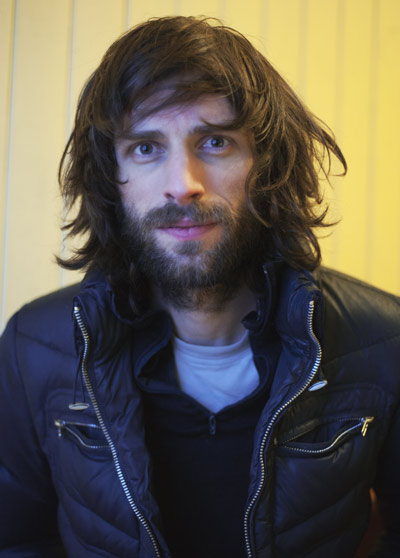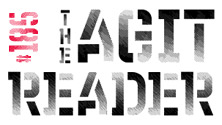
Lost in Space
by Matt Slaybaugh
First, Hans-Peter Lindstrøm became a fixture in the international dance-music scene. He then shrugged off the “space disco” label, releasing the 55-minute, three-track Where You Go I Go Too and proving he takes utterly none of it seriously with a 42-minute “Little Drummer Boy” mix. As if that wasn’t enough, he surprised pretty much everybody by creating a pop-masterpiece with Christabelle in 2009 and landing on an impressive number of year-end best of lists.
Somehow, though, Lindstrøm has only become more determined to follow his muse, whether or not it confounds his critics and fans. On his newest release, Six Cups of Rebel, he’s intent on showcasing some of the least hip sounds he could dig up and challenging us to hear past our preconceived notions. His mission is at least partially vindicated by Pitchfork’s knee-jerk need to praise the closing track’s “relative tastefulness” after slinging critical mud at the rest of the record. These sounds may indeed make you cringe if you’re not ready for them. I myself was initially reminded of Andrew Lloyd Webber’s The Phantom of the Opera before remembering the Yamaha keyboard my parents bought for me after the sixth grade. But if you can get past your well-trained ears and refined musical palette, you’ll have the opportunity to tap into the obvious joy that Hans-Peter put into the work and all the subtleties that lie beyond first impressions.
Do you think this album will shock people?
Hans-Peter Lindstrøm: Maybe it will shock some people. I don’t really expect those people who might have been into the previous albums to be into this one, and I don’t really mind. It is kind of interesting to do something a little bit different every time.
What is shocking about it?
HPL: Some people are just afraid of everything that sounds kind of weird. Some people think disco is not cool, though this one is not disco whatsoever. Some people think using prog elements in music is not cool. I disagree totally. I didn’t really want to follow either of the previous albums with this one, but I love music with prog elements and I knew that I was going to do this sooner or later.
Let’s talk about the sounds on this record, like on “Call Me Anytime,” for instance. Surely you know these sounds are out-of-date. It’s like you used the synthesizer I owned when I was 12 years old.
HPL: What’s the matter with these sounds? If used right they can be cool and interesting. Everybody’s writing right now about vintage synths and analog hardware, and I have been there before from time to time. But I got tired of reading about how much people are praising their Jupiter 8s or Memorymoogs. I just want to do something different. So maybe I am using sounds that are not in vogue anymore. In the late 80s, people were giving their Moogs away for free because those sounds were not in vogue at that time. So sooner or later people will love the intro to “Call Me Anytime.”
You think your record will make those trends change?
HPL: No, definitely not. I’m just interested in making contrasting music, and it can be interesting to use artificial or fake sounds. Like that organ on the first track: it’s not real, it’s just a MIDI organ. I was using the MIDI organ when I was composing the track, and I thought maybe I ought to record everything for real, but I kind of like the artificialness of the MIDI organ. Sometimes you get the real thing and it’s so massive and it’s so great, but it can be good to hear something artificial, like what happens when you play on the MIDI thing and you reach the high notes—and you can’t even play that high on a real organ. So there’s stuff happening digitally when you play those notes.
Is this music for dancing? Driving? Making love? Making dinner?
HPL: I didn’t make it for a discotheque or some kind of dancing. I’m not sure if it has any other functionality other than sitting down with your headset or a pair of good speakers. I’ve been driving with it on, but I’m not so sure it’s perfect driving music. It’s not for making food or making love. It can be a lot of noise, and sometimes it’s just too weird. I would say it’s for sitting down and listening to the album. You have to listen to it many times because it’s not the easiest album to digest. Hopefully after listening to it you will be rewarded.
Were you worried about the critical response?
HPL: For some reason, a lot of people have been writing really kind words as long as I can remember. So I’m expecting some kind of backlash sooner or later. I wouldn’t be surprised if it happens with this album. After Where You Go, even my label and management were like, “You really want to do this vocal thing with Christabelle?” because people were expecting something epic and grand. Maybe doing this album I’m trying to tell people, “Please let me do my thing. I’m probably going to give you something new, and maybe next time you’ll like my stuff.” Really, it’s all about trying to make something for myself, and I hate the thought of repeating myself. I think the worst thing would have been if I’d just been trying to follow up the Christabelle album or the Where You Go album, and I was really happy with those two albums. So I’m trying something new and not worrying so much about the critical reception or whatever. I’m aware that I might be slowly digging my own grave here.
That sounds like Miles Davis. He kept changing so quickly and by the time people caught up with him, he’d moved on, and he just didn’t care.
HPL: I’m not comparing myself to Miles Davis, but I do like people who aren’t occupied by giving people what they think they want. I like how people like Neil Young, who was doing Trans after all that acoustic stuff. I really respect that kind of artist, who’s doing stuff that people aren’t expecting.
